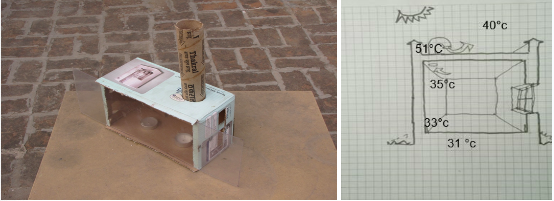Convection in a Room
Subject
Climatology
,Academic Year
2'nd Year
,Complexity Level
Beginner
,Content tags
Convection
,Cross Ventilation
,Passive Design Principles
,Activity Type
Demonstration
,Activity duration
< 30 mins
,Objective: To understand the convective flow of air through the openings in a building
Note: to be done in a relatively wind less space- say a corner of a room cordoned off
Outcome: Students develop a deeper understanding of convection that can help in designing passively cooled buildings having lower thermal loads
Requirements: Teaching aid model: room with two windows and a chimney, candles, small table fan,match box
Prerequisites: None
Procedure:
Step 1: Place candles inside the teaching aid model as shown in the reference image.
Step 2: Light the candles inside the room for a few minutes. The air in this small space heats up
Step 3: Keep the fan beside the room model such that both the windows and axis of the fan’s blades are collinear.
Step 4: Switch on the fan.
Step 5: Students can see a large amount of smoke (warm air) rising through the chimney, and a small amount coming out from the window on the opposite side of the fan.
Step 6: Discuss:
- Warm air naturally rises up.
- When it is forced through a narrow enclosed space such as a chimney, a greater vacuum gets created in the room ( imagine air flow in a tunnel-its faster)
- Which then draws cooler air from the surroundings-various openings- to circulate.
- This creates a continuous convective flow of air within the room.
- Based on the position and size of openings good cross ventilation is ensured
- What is the alternative for chimneys in this experiment? (Higher roofs, Roof vents?)
- Probe students to think of such design elements used in the traditional buildings where this principle has been applied for eg. courtyards.
Step 7: Experiment with different sized openings as well as different spaces and observe and understand how this convection as a principle is working in the spaces.
Step 8: Discuss how the principle of convection of warm air rising inside a room can be used to design naturally cooler homes
Reference Image:

